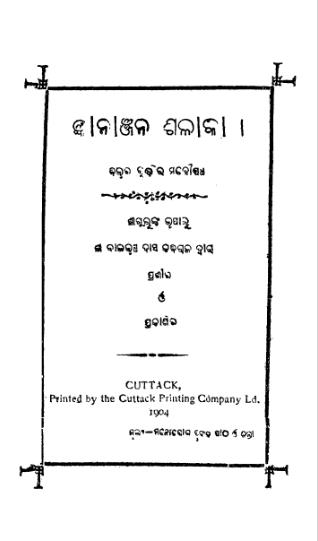Published in 1904, Gyananjana Shalaka by Bala Krusna Das represents a significant contribution to the essays genre within early 20th-century Indian literature. This work, whose title translates to The Essence of Knowledge, embodies a rich tapestry of philosophical reflections, cultural commentary, and educational discourse. It serves as both an intellectual exploration and a cultural artifact, reflecting the evolving thoughts regarding knowledge and its role in society during a transformative period in Indian history.
The turn of the 20th century was a time of great upheaval and change in India. Amidst the impact of British colonialism, there was a burgeoning awareness of the importance of education, enlightenment, and intellectual discourse. As reformers sought to uplift society through knowledge and awareness, works like Gyananjana Shalaka became essential in articulating these ideals. Bala Krusna Das, a keen observer of his times, used his essays to engage with contemporary issues while advocating for a deeper understanding of knowledge and its applications.
Gyananjana Shalaka comprises a collection of essays that delve into various aspects of knowledge – its sources, significance, and the responsibilities that come with acquiring it. The essays reflect a profound understanding of the multidimensional nature of knowledge, exploring not just its theoretical frameworks but also practical implications in daily life.
Bala Krusna Das addresses diverse topics such as the importance of education in personal and societal growth, the relationship between knowledge and morality, and the role of cultural heritage in shaping an informed citizenry. His essays encourage readers to think critically about what they learn, fostering a sense of curiosity and a desire for lifelong learning.
One of the central themes in Gyananjana Shalaka is the pursuit of wisdom beyond mere academic achievement. Das emphasizes that true knowledge transcends rote memorization or superficial learning; it encompasses critical thinking, ethical considerations, and a deep engagement with one’s surroundings. He advocates for a holistic approach to education, where learners develop a well-rounded perspective that integrates intellectual, emotional, and moral dimensions.
Furthermore, the essays often reflect on the role of individuals in the larger societal context. Das encourages readers to consider how their learning can contribute to the community and the nation. This call for social responsibility and active participation in civic life resonates deeply with the reformist spirit of the time.
Bala Krusna Das’s writing style in Gyananjana Shalaka is both reflective and persuasive. His eloquent prose navigates complex ideas with clarity, making them accessible to a broad audience. The structure of each essay invites readers to engage thoughtfully with the subject matter, guiding them through a logical progression of ideas.
The use of anecdotes and illustrative examples enriches the text, allowing readers to connect abstract concepts to real-life situations. Das’s ability to weave personal reflections with scholarly insights gives the essays a unique depth, encouraging readers to engage in their own reflective practice.
The impact of Gyananjana Shalaka extends beyond its publication date, as it remains an influential text in the discourse on education and knowledge in India. Bala Krusna Das’s work continues to inspire educators, scholars, and thinkers who advocate for a progressive and inclusive approach to learning.
By promoting the value of critical thought and ethical engagement, Gyananjana Shalaka has carved a niche in the canon of Indian essays, encouraging future generations to reflect on the transformative power of knowledge.
Books Info
| Books name | Gyananjana Shalaka / ଜ୍ଞାନଞ୍ଜାନ ଶାଳକା |
| Author | Bala Krusna Das |
| No Of pages | 36 |
| Publisher | NA |
| Publication | 1914 |
| Printed At | The Cuttack Printing Company Ltd. |
| Distributor | NA |

